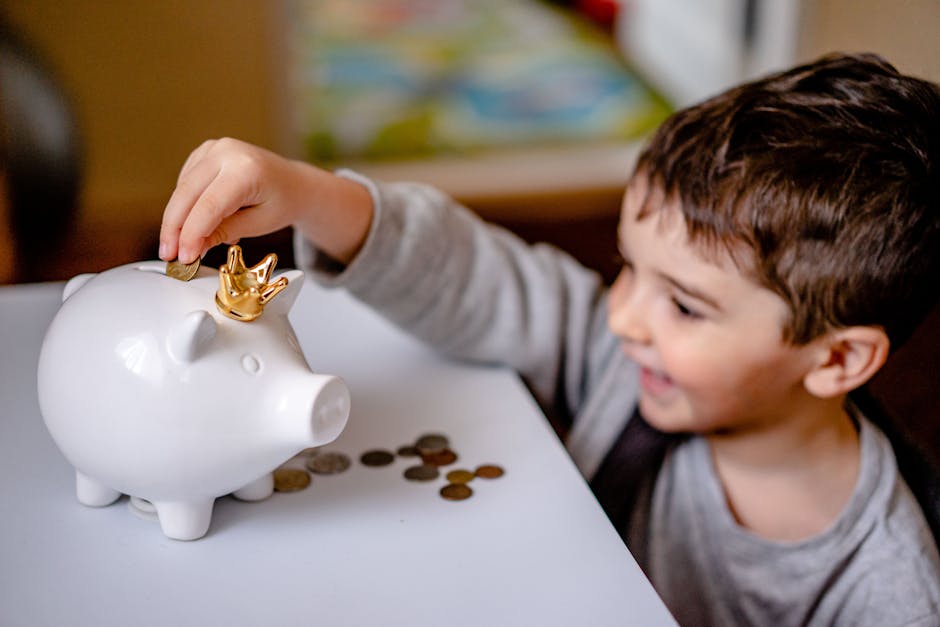Teaching kids about money doesn’t have to be complicated or boring. Starting early sets them up for a secure and confident financial future.
Kids learn best through everyday experiences and simple habits. Using relatable, practical lessons helps money management stick.
Frugality is more than just saving money—it’s about making thoughtful choices. Encouraging mindful spending teaches kids the value of every dollar.
By nurturing these habits young, you’re giving your children tools for independence and smart decision-making. It’s a gift that lasts a lifetime.
Let’s explore 21+ frugal habits to teach your kids that are both easy to implement and life-changing. These tips will grow with them as they navigate their financial journey.
Ready to empower your kids with money smarts? Let’s dive in!
Building a Foundation: Understanding Money Basics
Before diving into complex financial concepts, kids need a solid grasp of what money is and why it matters. This foundation helps them appreciate the value behind every coin and bill they handle.
Introducing simple, relatable ideas about earning, saving, and spending helps children develop a healthy relationship with money early on. It also sets the stage for smarter choices as their financial world expands.
Here are five fundamental habits to get your kids comfortable with money basics:
1. Explain the concept of money as a tool – Help your kids understand that money isn’t just for buying toys or treats; it’s a tool to meet needs, save for goals, and even help others. Framing money this way encourages thoughtful use rather than mindless spending.
2. Teach the difference between wants and needs – Guide your kids in distinguishing essentials like food and clothing from fun extras like video games or candy. This habit helps prioritize spending and develop self-control early on.
3. Use clear jars or envelopes for saving – Visual aids like labeled jars for saving, spending, and sharing make abstract money concepts tangible. Watching their savings grow motivates kids to keep at it.
4. Practice counting and handling real money – Let your children physically count coins and bills during purchases or play. This hands-on experience builds comfort and numeracy related to finances.
5. Set simple earning opportunities – Whether it’s chores or small tasks, earning money teaches the connection between effort and reward. It also fosters responsibility and pride in managing their own funds.
With these basics down, kids are ready to explore how to manage money wisely in everyday life.
Smart Spending: Making Thoughtful Choices
Teaching children to spend wisely is a cornerstone of financial literacy. It’s not about denying fun but about making informed decisions that align with values and goals.
Encouraging kids to weigh options and consider the true cost of purchases helps them avoid impulsive buys. They learn to find balance between enjoying today and saving for tomorrow.
Here are five habits that promote thoughtful spending:
6. Encourage price comparison – Show your kids how to compare prices before buying something. Whether shopping online or in stores, knowing how to look for deals helps them get the best value and avoid buyer’s remorse.
7. Discuss delayed gratification – Teach your child the benefit of waiting before making a purchase, especially for bigger items. Delaying gratification often leads to better decisions and sometimes even discounts or sales.
8. Set spending limits – Giving kids a clear budget for certain purchases helps them learn to manage money within boundaries. It also sparks creativity in finding affordable or free alternatives.
9. Encourage borrowing or sharing – Instead of buying everything new, suggest borrowing books, toys, or games from friends and family. Sharing not only saves money but builds community and generosity.
10. Teach them to read labels and understand quality – Sometimes paying a bit more means getting a product that lasts longer. Help kids recognize the value in quality over quantity, which ultimately saves money.
Smart spending habits prepare kids to make decisions that respect both their budget and their needs.
Saving and Goal Setting: Planning for the Future
Saving money is a skill that benefits kids well beyond childhood. It teaches patience, discipline, and the importance of planning ahead.
Helping children set clear goals for their savings turns abstract concepts into motivating challenges. Whether it’s a new bike or college funds, goals make saving purposeful.
Try these five habits to establish strong saving routines:
11. Set specific savings goals – Encourage kids to define what they’re saving for, whether it’s a toy, a trip, or a gift. Having a clear goal helps maintain focus and excitement.
12. Match savings contributions – Offer to match a portion of their savings to incentivize putting money aside. This “bonus” boosts motivation and shows the power of compound rewards.
13. Track progress visually – Use charts or apps to help kids see how close they are to their goals. Visual progress is encouraging and makes the process tangible.
14. Teach the concept of interest – Explain how money can grow over time when saved or invested. Even simple examples help kids understand why saving early is valuable.
15. Open a savings account together – If age-appropriate, open a youth savings account to introduce banking basics. This also reinforces the habit of setting money aside regularly.
With saving skills, kids build confidence and control over their financial futures.
Frugal Living: Everyday Money-Saving Practices
Frugality isn’t about deprivation; it’s about making smart, efficient choices that stretch every dollar. Teaching kids to live frugally equips them for unexpected expenses and long-term security.
Incorporating simple frugal habits into daily routines encourages mindfulness and creativity. Kids learn to appreciate what they have and find joy beyond material things.
Here are five frugal habits to nurture:
16. Repurpose and reuse items – Encourage kids to find new uses for old toys, clothes, or school supplies. This habit reduces waste and saves money by extending the life of belongings.
17. Practice energy-saving habits – Teach kids to turn off lights, unplug devices, and conserve water. These small actions lower household bills and promote environmental responsibility.
18. Cook simple meals together – Involve children in preparing homemade food rather than eating out or buying processed snacks. Cooking at home is cheaper, healthier, and a great skill to develop.
19. Use free or low-cost entertainment – Explore parks, libraries, and community events as fun alternatives to expensive outings. Experiences often create better memories than things.
20. Make gift-giving thoughtful and budget-friendly – Encourage kids to create handmade gifts or set spending limits for presents. This teaches generosity without breaking the bank.
Frugal living habits help kids appreciate value in every aspect of life beyond just money.
Financial Responsibility: Long-Term Habits for Independence
Financial responsibility is the ultimate goal of teaching kids about money. It ensures they grow into adults capable of managing their finances wisely and independently.
Instilling habits focused on accountability, planning, and giving back fosters well-rounded money management skills. These lessons prepare kids to navigate life’s financial ups and downs confidently.
Here are five essential habits to build financial responsibility:
21. Keep a spending journal – Encourage kids to record what they buy and how much they spend. This practice increases awareness of habits and highlights areas to improve.
22. Understand bills and expenses – Teach older kids about regular household bills and the importance of paying them on time. It demystifies adult responsibilities and reduces future stress.
23. Set up a giving plan – Encourage kids to allocate a portion of their money to charity or helping others. This builds empathy and a sense of purpose beyond personal gain.
24. Discuss credit and debt basics – Introduce simple ideas about borrowing, interest, and responsible credit use. Early knowledge helps prevent costly mistakes later in life.
25. Encourage entrepreneurial thinking – Support kids in small business ventures like lemonade stands or crafts sales. This teaches initiative, budgeting, and the value of hard work.
These financial responsibility habits round out a comprehensive money education that serves kids for life.
Instilling frugal habits in kids is a gift that keeps on giving. By nurturing these skills, you empower them to make confident money decisions throughout their lives.
Start small, be consistent, and celebrate progress together. Your efforts today build a foundation for their financial freedom tomorrow.
Thanks for reading—here’s to raising money-smart kids ready to thrive!



